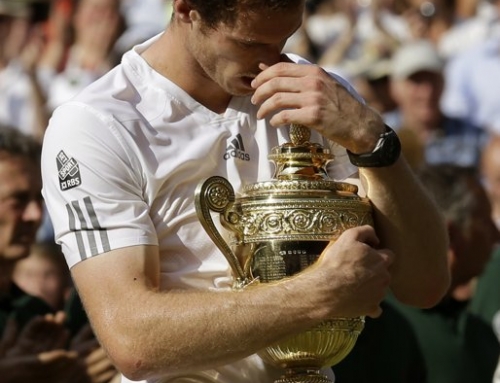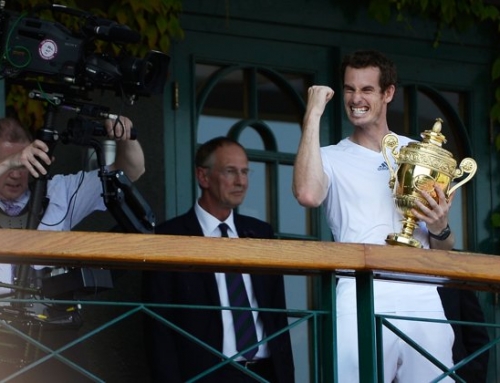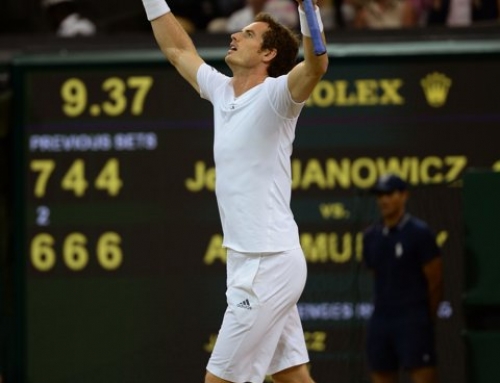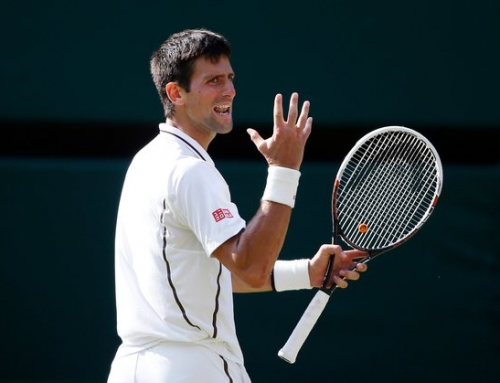 On the surface, everything is stacked against Andy Roddick. Head-to-head, Federer leads 18 matches to 2. Roddick has reached 4 Grand Slam finals, winning 1, losing 3. All 3 losses have come to Roger Federer. In a Wimbledon that is without one big rival, Rafael Nadal, Andy Roddick again faces Roger Federer.
On the surface, everything is stacked against Andy Roddick. Head-to-head, Federer leads 18 matches to 2. Roddick has reached 4 Grand Slam finals, winning 1, losing 3. All 3 losses have come to Roger Federer. In a Wimbledon that is without one big rival, Rafael Nadal, Andy Roddick again faces Roger Federer.
To Andy Roddick, Roger Federer must be like Pete Sampras is to his Andre Agassi, except arguably, Agassi was at the very top of the game, and even then, found it near impossible to beat his longtime rival. Roddick, on the other hand, while challenging for the top spots up to about 2005 seems to have faded some. Not out of the top 10, to be sure, but enough for a new crop of young players to make his life difficult. He and Lleyton Hewitt, two old married guys, can relate to this situation, trying to stay relevant in a changing tennis world, and still unable to find ways to beat Roger Federer.
Roddick came up with a group of young guns, the ones that eventually supplanted Pete Sampras. The US Open was the proving grounds for the Fed generation, except it was Marat Safin first in 2000, then Lleyton Hewitt in 2001 that beat Sampras in consecutive years. Roddick might have been that next guy, but he fell meekly to Pete Sampras in 2002, a straight set dismissal in 2002, the year Sampras won his 14th and final Grand Slam major. Roddick would finally complete his quest in 2003, beating yet another of the Fed generation players, Juan Carlos Ferrero.
Roddick seemed like the kind of guy that might replace a Pete Sampras. More photogenic than Sampras, Roddick had a huge serve, a big forehand, the two requisite weapons of a modern player. What he seemed to lack was imagination. He wanted to win with power alone. He was a bit lucky that Roger Federer was fighting his own demons wondering what it would take to become number 1, but once Federer broke the physical and mental barrier, he engineered a kind of stranglehold on the game that was near absolute, only tainted by the fearless game of Rafael Nadal.
What happens when you are talented enough to hit the biggest serves in the game, but lack the variety of shot, the mental tenacity, to win big points? Roddick must have felt much like Agassi did, often staring as Sampras would trade long rallies and win them. Agassi must have despaired when he could not return enough Sampras serves and had to rely on his ground game to work hard to win his own serves.
How does it feel to be so talented, and look across the net at someone at another level? What kept Roddick in the game was a desire to do the best he could, and that meant admitting that he lacked the skills to be the best, but that he had enough skills, if the stars align, to perhaps make an impression. He was Salieri to Federer’s Mozart, wondering what secrets Federer knew that he did not.
Give credit to Roddick for trying something–anything–to beat Roger Federer. Come to net, play patient, serve and volley. Surely, Roger had some weakness which he could exploit. But Roddick can only change his game so much. He can’t hit the unnatural topspin of Rafael Nadal. He doesn’t have Nadal’s bullish strength, nor his blazing speed. Roddick didn’t even have a part of a game that he should have had, a volley. Roddick volleyed as well as a pro does, but he couldn’t rely on a serve and volley game. He wasn’t Pete Sampras. Heck, he wasn’t even Mardy Fish.
Roddick has often sought advice with coaches, and each coach always seemed to give him a boost. When he worked with Brad Gilbert, he won his only Grand Slam major. He worked with Jimmy Connors, and his brother, and Patrick McEnroe, and now, Larry Stefanki. By the time he hooked up with Stefanki, Roddick had already evolved his game, to a patient baseline style, a far cry from how he used to hit. He still had power if he needed it, but this patient style actually won him a fair number of matches. He still had his serve. Not only was it among the best serves in the game in terms of speed, it was also one of the most consistent. Roddick often serves at 70% or better. It’s a consistency that he shares with Ivo Karlovic. Strange how the best servers hit hard and consistent.
Stefanki looked to make a few changes. Fitness was the first change. Roddick should never tire from playing a long five set match. He should be fit enough to chase down shots. Roddick needed to add some finesse to his game. He learned a drop shot, a drop volley. It may be hard to teach an old dog new tricks, but the game was moving in this direction, and Roddick needed a few more tricks to use.
Meanwhile, there’s Federer. Ah, Roger Federer. Federer had come off a very successful two years, indeed, perhaps the most successful two years of any tennis players career. That was 2006 and 2007 where he won the small Slam, winning 3 of 4 Slams, both years losing the elusive French to his Spanish rival. He must have thought that 2008 would continue his awesome streak, but one thing stopped Federer, and it wasn’t human.
It was mono.
Due to a lack of serious practice, Federer started losing matches that he used to never lose. Federer has always had errors in his game, but they were now inexplicably creeping in. He would shank forehands and backhands. This would be enough to lose a game a set, and enough to lose to a variety of players.
Credit Federer for always being ready to play the majors, for despite his illness, he made the semifinals of the Australian Open. He reached the finals of the French. But, for the first time, he gave up his hold on Wimbledon. He would struggle on the hardcourt season. He would lose to James Blake at the Olympics. This level of perfection seemed to be fading. What was wrong with Roger Federer?
But at the Olympics, he seemed to find some solace. Teaming up with Stanislas Wawrinka, he unexpectedly won a doubles gold medal. That put a smile on his face, and he felt really good going into the US Open. He lucked out a bit. Andy Murray had been playing fantastic hard court tennis. He had beaten Djokovic twice. Murray also found a way to beat Rafael Nadal. Although Nadal had traditionally faded by the US Open (as he would once the indoor season rolled around), Nadal had still made the semifinals. When a rain delay caused his semifinals to be delayed a day, everyone thought for sure that Nadal would come back and win in five sets.
And he came back to win the third set, but Murray found a way to win.
Meanwhile Federer was feeling a resurgence. He had just dominated Djokovic in the semifinals, and he would do the same to Andy Murray in the finals to reach his 13th major, one that seemed so elusive after Wimbledon and after his hardcourt results.
But Federer would again fade. He trained hard in the offseason to try and get better, to make up for lost time. It was said he worked on his serve, and he worked on his volley. However, his back had bothered him at the end of 2008, and he needed time to recover from that.
Federer again made the Australian Open final, but he failed to make Nadal work hard. Nadal had played a marathon match against Fernando Verdasco. It was thought Federer might exploit Nadal’s fatigue, but Federer stubbornly played Nadal as if Nadal were fine. Still, who could blame him. Federer went five sets before wilting badly in the fifth set, the pressure seemingly too much to bear.
Federer then decided to take time off. He needed to work on his game. He skipped his Davis Cup commitment, and worked on his serve and worked on his fitness. His results were a bit patchy. He was losing early in Indian Wells and Miami. He lost to Wawrinka and Djokovic. But finally, at Madrid, Federer put it together. He managed to beat Rafael Nadal. Little did anyone know that Nadal, looking a bit peeved in the semis against Djokovic, was not 100%. No matter, it gave Federer confidence.
And when Nadal fell to Robin Soderling, in the biggest upset in recent memory, Federer worked very hard to get through the French, fighting his way through two four setters, and two five setters, to finally capture his first French crown.
And when that happened, the tears of sadness that befell Roger in Melbourne changed to tears of joy. The quest that had lasted years was finally over. And Roger could go into Wimbledon relaxed.
And so here he is again, feeling as he has so many times before. Without Rafa in the final, Roger feels he has as good a chance to beat the rest of the field. Even as Roddick has played sublime tennis in the semifinals to reach his first Wimbledon final since 2005, Federer has to feel good, has to feel relaxed.
So Roddick will hope that Stefanki can think of something that will hold Roger at bay. Something that might take him to several tiebreaks. Maybe Andy will have a Goran moment. Goran Ivanisevic had labored for so long to win Wimbledon. He lost to Agassi, then to Sampras twice. He was seriously beginning to wonder if he’d ever win Wimbledon. Then, he met Patrick Rafter in the final, and Rafter gave it everything he had, but when the match was over, Goran wept. He had tried so hard, and finally, he got his reward. It was very reminiscent of Jana Novotna choking away a third set lead to Graf, but finally winning it in 1998 over Nathalie Tauziat.
Roddick’s task is daunting. Federer seems to have gotten his fire back, and he’s looked good against all comers. Even the blip of a set he lost to Kohlschreiber was beaten back with a 6-1 final set.
Roddick wondered if he would ever reach this stage again. Wondered if he had the game to compete in a finals again. Now the question finally is, does he have the game to finally break through and beat the rival that has vexed him so?







![[Wimbledon, QF] Murray scraps out 5-set win over Verdasco to reach semifinals](https://www.essentialtennis.com/wp-content/uploads/2013/07/20130703murray-500x383.jpg)